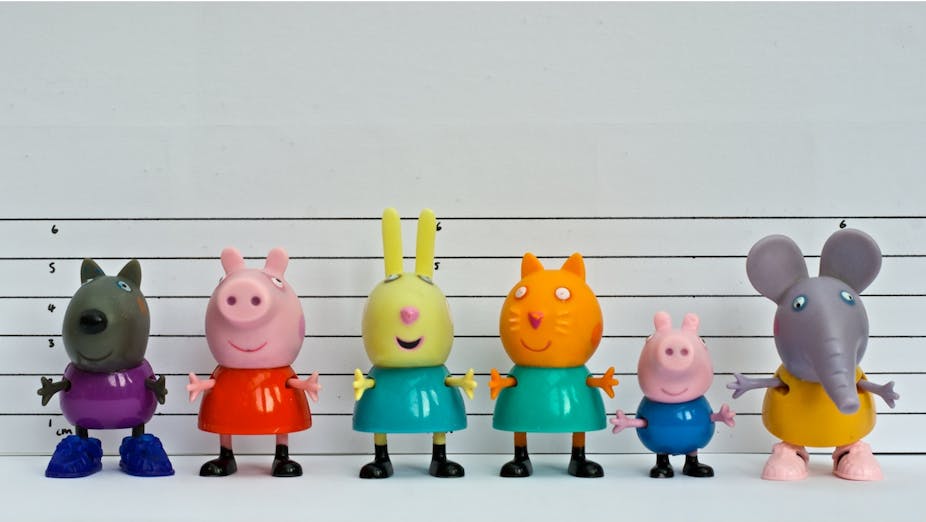Malcolm Turnbull’s well-telegraphed announcement yesterday that the ABC’s funding will be cut by A$254 million over five years is no surprise. But, broken election promise aside, this is actually something Australians as a whole will benefit from.
There are two broad reasons for this – one involving use of the phrase “Slutsky equation”, so let’s get to that first: it sounds fun.
The noisiest concern with the consequences of the ABC cuts seems to be focusing on the ABC itself, such as all the pigs or bananas they’re threatening to fire.
Turnbull says he’s found lots of efficiencies stacked away in their back office. It’s basically un-Australian not to show love and support for the ABC – even News Corp editorials lead with that line.
About 71% of Australians are ABC customers, a similar amount to the number who are also taxpayers. The fact all these Australians are on both sides of this market is what makes changes to its compulsory funding an interesting economic question.
The important thing to understand about the funding cuts is they’re like the opposite of a tax increase. You have to pay less – but in return, you get less. Or, looked at the other way, it’s like your own income has gone up (now that you pay less tax), but so has the price of some of the things you’re buying (all those government pigs and bananas).
To unpack whether you’re actually better off, economists like to use the Slutsky equation, which decomposes a price change into two components:
1) an income effect
2) a substitution effect
When the price of pigs or bananas goes up, with your income unchanged, you’re worse off, because you can now consume less pigs or bananas. That’s the income effect (i.e. you would need a higher income to maintain the same happiness level of pig/banana consumption).
But when the price of pigs or bananas goes up, consumers will also tend to make substitutions toward whatever are now the relatively cheaper alternatives: maybe kittens and pineapples. This is the substitution effect, and it offsets the income effect.
The thing about the funding cut is that, from the perspective of the taxpayer and consumer, this looks like two things. The income effect is that taxpayers are now off the hook to the tune of A$254 million, which increases their income by that amount. (Let’s assume the money is not snaffled as it scurries back to the warm pockets it was originally in.)
But what’s really at issue is the substitution effect – the extent to which ABC consumers experience, and respond to a rise in the “price” of, the ABC product.

Turnbull says the funding cut needn’t affect programming, just back office matters: he thinks the consumer won’t experience any change. ABC boss Mark Scott has threatened to slaughter every last pig and mash every banana on site. He wants consumers to experience a change.
Now if operational efficiency really is what this is all about then Turnbull and Scott need to sort that out between them. But let’s say all cuts find their way on screen: maybe fewer pigs, maybe less back-office support makes for a lower quality pigging experience.
From the consumer’s perspective it’s all much the same: it’s as if pigs and bananas are now more expensive. What an economist will expect to observe, once all the squealing quiets down, is some substitution occurring.
Consumers will find pig-like and banana-like media in other places. It’s absurd to think this is not the case. Almost every media market the ABC is in is highly competitive. What that means is that while substitution might not be 100%, it isn’t 0% either.
A healthy competitive media environment is good for Australia too, and having a large, subsidised producer in the centre of that does not contribute to that outcome. This is of course a different story if the ABC was serving only the parts of the media market that are unprofitable (remote and some regional news and sports, for instance, or Labor Party hagiographies) or other areas of genuine market failure. But that is manifestly not what is going on.
Now of course there is public value in media diversity, and there is a certain public good argument to be made in the ABC front-running experimental media programming, formats and technologies.
Emergency warnings and civil defense announcements are obvious social goods. And the ABC does provide some cross-subsidy in journalistic training. But these funding cuts do not make a mark on any of these considerations.
Overall, for the average tax-paying ABC-watching Australian, the income effect will likely dominate the substitution effect.
In short: we will be left better off by the cuts.

